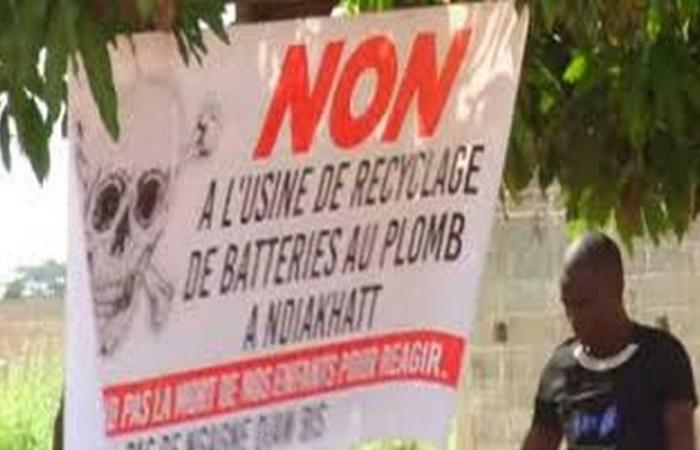
The populations of the villages attached to the communes of Pout and Keur Moussa, located in the department of Thiès, have expressed their dissatisfaction with the resumption of activities of the lead recycling plant installed in Ndiakhate. Sunday January 12, 2025, residents of the area gathered in the village of Palal to denounce the harmful effects of this factory on their environment and their health. They deplored that the resumption of the factory cancels many advances obtained since the start of their fight for the relocation of this industrial unit, between 2020 and 2022.
The collective fighting against pollution generated by the factory, coordinated by Mamadou Lèye, recalled that a meeting took place in October 2024 with the Minister of the Environment to discuss the problems linked to this factory. During this meeting, the members of the collective exposed the environmental and health risks posed by the lead recycling plant. However, two weeks after this meeting, the factory resumed its activities, exacerbating the suffering of residents who have suffered negative impacts since the establishment of the factory in Ndiakhate.
Impact on health: an increase in serious illnesses
Local populations denounce an alarming increase in diseases which were absent from the area before the installation of the factory. Among these diseases are asthma, sinusitis, spontaneous abortions and other serious pathologies, according to the coordinator of the collective, Mamadou Lèye. Area residents say these health problems are directly linked to emissions from the plant.
The coordinator also reported a significant decrease in agricultural yields in areas near the factory, as well as the need for some farmers to leave their lands located near the factory. Those who persevered in cultivation had to face a “drastic drop” in their harvests. Farmers also deplore that some of them have been forced to abandon their fields due to pollution. “We are going through enormous difficulties because of this lead factory,” explained Mamadou Lèye.
Reactions from the authorities and contradictions on the exemption
In 2023, the Minister of the Environment at the time, Alioune Ndoye, sent a formal notice to the recycling plant after a technical inspection which confirmed pollution in the communes of Pout and Keur Moussa. However, a few months later, the government granted the factory a three-month exemption, which it justified by the need to allow the factory to exhaust its battery stocks. This decision shocked local populations, who were expecting a lasting solution to stop the factory’s activity. Mamadou Lèye regretted this exemption, stressing that the community only wanted one thing: the permanent relocation of the factory.
Factory response and pollution studies: a complex situation
In May 2023, plant officials, accompanied by an independent consultant, organized a tour for journalists to address accusations of pollution. The consultant, Serigne Abdou Lahad Yade, presented results of studies which, according to him, showed that the levels of lead in the air and on the ground, measured around the factory, were well below the authorized thresholds . He also specified that the samples had been taken by a laboratory at the Institute of Applied Nuclear Technology (ITNA) at Cheikh Anta Diop University in Dakar, with the possibility of an independent second opinion.
According to the consultant, the factory had installed electrostatic filters to retain up to 99% of the lead particles emitted by the chimney, which explains the low levels of pollution measured in the ambient air. However, he recognized that the surrounding air was heavily loaded with clay dust due to the proximity of a cement factory, which could also affect air quality. The consultant concluded that accusations of pollution from the plant were exaggerated, but recommended protective measures for staff, such as gas masks and protective glasses.
The situation remains uncertain
Although the plant’s study suggests pollution control, residents in the area continue to live in uncertainty and discontent. Mamadou Lèye and the populations of Pout and Keur Moussa insist on the need to close or move the factory to avoid new health and environmental risks. According to them, the priority is to guarantee a healthy living environment and to allow residents to carry out their economic activities without hindrance.
Moctar FICUU / VivAfrik





